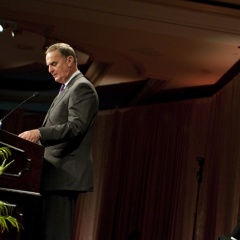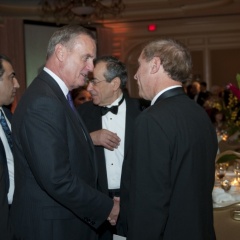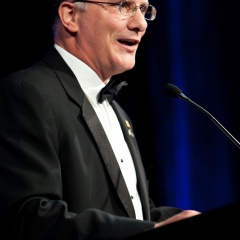As delivered
Thank you Ziad for that kind introduction. As Ziad mentioned, we first met in 2007 when I was appointed Special Envoy for Middle East Security and we also worked together on the US-Palestinian Partnership. Ziad has been a great friend ever since, and he has served this body as President with distinction. May ask you to join me in recognizing his record of service to this organization and the cause of peace between Israelis and Palestinians. Ziad, thank you.
Ladies and gentlemen, I am deeply honored to represent President Obama at the Fourth Annual Gala of the American Task Force on Palestine. For six years, ATFP has been an independent and influential voice in promoting an end to the conflict in the Middle East through a negotiated agreement for two states, Israel and Palestine. ATFP has taken a clear stand against violence, no matter what the cause, and no matter the victims or the perpetrators. It has partnered with USAID and other US agencies, NGOs and think tanks to help improve life in the West Bank and Gaza in very, very concrete and meaningful ways. It has worked to bring the Palestinians closer to fulfilling their legitimate aspirations for statehood, and to unleash the extraordinary potential of the Palestinian people.
There are so many distinguished guests in the audience that it is impossible to mention everyone by name, but I do want to recognize the honorees, Dr. Fuad Jubran, Prof. Shibley Telhami and Dr. Najat Khelil who have done so much to enrich both American and Palestinian societies. I also want to recognize Amb. Robert Pelletreau, here to be recognized for his role in initiating 20 years of US-Palestinian diplomacy, as well as the PLO representative to the United States, Maen Areikat, and, of course, Dr. Asali himself.
Honored guests, the President is committed to achieving two states, Israel and Palestine, living side-by-side in peace and security. Make no mistake about that. He is personally committed to this goal because he believes that peace is in America's interests, just as it is in the interests of the Palestinian and Israeli peoples. The President has recognized that this will be a difficult task, but he has emphasized that he will pursue it with the patience and the dedication that this task requires.
He has backed up these words with action. On just his second day in office, he appointed one of our most trusted senior officials, Sen. George Mitchell, to be his special envoy for Middle East peace. Since that time, the President has traveled to Cairo to address the Israeli-Palestinian conflict head-on, and has met and spoken with his counterparts numerous times to advance the cause of peace, as he did last month during the UN General Assembly in a memorable address to that body. All the while, he has fully supported Sen. Mitchell's diplomacy, because this is a clear priority for this administration, and because this President was not going to wait to do something about it until the end of his administration.
Throughout the past several months, I believe that our policy has been clear, unambiguous and consistent. We have called on all parties to meet their responsibilities and to take steps to promote an environment in which negotiations can prosper and succeed. These steps were never meant as an end in themselves but as a way to relaunch talks on the core issues of the conflict: security for both Israelis and Palestinians, borders, refugees and Jerusalem.
For Israel, these steps have included stopping settlement growth, dismantling outposts and improving access and movement in the West Bank. For the Palestinians, it has meant continuing efforts on security and reforming the institutions of governance. And for the Arab states, it has meant reaching out to Israel to demonstrate the benefits of the Arab Peace Initiative as Israel takes steps towards peace.
But our approach has not focused only on addressing the political issues that separate Israelis and Palestinians. It is also based on building an infrastructure for peace through bottom-up efforts to help the Palestinian Authority ensure security, develop its institutions and provide for the Palestinian people. The Palestinian Authority under the leadership of President Abbas and Prime Minister Fayyad has made great strides towards achieving these goals. I witnessed this progress firsthand in 2008, when the PA transformed Jenin from a battle-scarred hotbed of violence into the secure, hopeful city full of people with great expectations that we see today.
The PA recently took these efforts a step further with its two-year plan to build the institutions of a Palestinian state. We have strongly supported President Abbas and Prime Minister Fayyad as they have taken responsibility for their own fate and focused on what the PA can build now to shape the future, instead of waiting for the conflict be resolved before this important work can be begun.
As the President said a few weeks ago in New York, we have made some progress towards the goals we set out earlier this year both on these bottom-up efforts, and on getting the parties back to the negotiating table. But we must do much, much more. The time has come to relaunch negotiations without preconditions to reach a final status agreement on two states: a Jewish state of Israel, and a viable, independent and contiguous Palestine that ends the occupation that began in 1967 and realizes and unleashes the full potential of the Palestinian people.
Sen. Mitchell has worked hard with the parties over the past few weeks to find the right formula through which to begin these talks. We will continue that effort in the coming weeks, because it is our strong and unequivocal view that we must move beyond talking about talks and get to the hard work of addressing the core issues that separate Israelis and Palestinians.
As we do so, we cannot forget the people of Gaza and southern Israel. Just as we defend Israel's right to self-defense, we cannot accept the continuing humanitarian crisis in Gaza. And so, we call for a reopening of the crossings, with an appropriate monitoring regime, to allow for the entry of legitimate goods into Gaza, because progress in the daily lives of the Palestinian people must absolutely and unequivocally be a part of the road to peace. We also continue to call for the immediate release of Gilad Shalit.
The task ahead, ladies and gentlemen, will be difficult, there will be setbacks, there will be challenges, there will be false starts, but the people of the region have been suffering for too long for this conflict to be neglected once more. As President Obama has reminded us, what is at stake in this conflict is nothing less than the dignity and the security of all human beings.
As we meet here tonight, we know that there are Palestinian children who lack the hope and the opportunity that is their right, just as there are Israeli children who lack the security that they deserve. This is what motivates us to move forward. The United States will always stand for peace, and will always work to achieve it to secure the future for Israelis, Palestinians and Americans alike.
It is a great honor to be with you to share these few thoughts. I can assure you that President Obama's dedication to achieve these goals is unshaken, that he is committed, and that he will be relentless in the pursuit of achieving these dreams for our people, for the Palestinians and for the Israelis alike. Thank you very, very much.
<< Back:Gen. Jones Introduction | Home | Next >>
TAGS:
















































